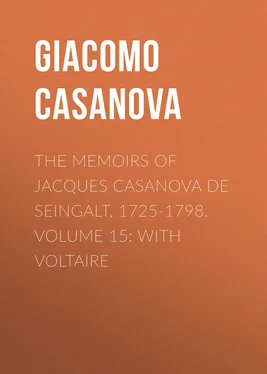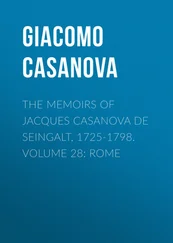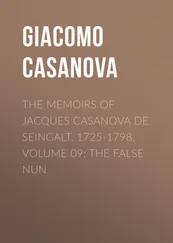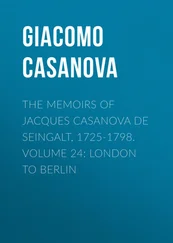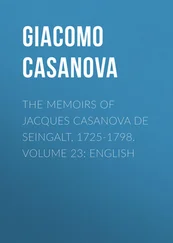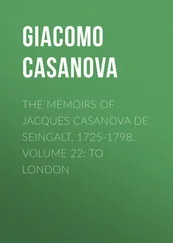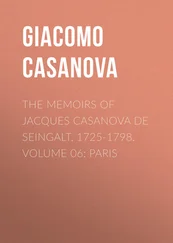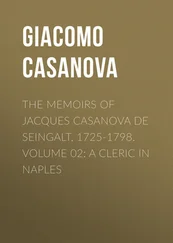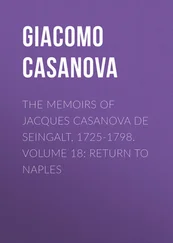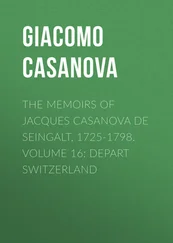Giacomo Casanova - The Memoirs of Jacques Casanova de Seingalt, 1725-1798. Volume 15 - With Voltaire
Здесь есть возможность читать онлайн «Giacomo Casanova - The Memoirs of Jacques Casanova de Seingalt, 1725-1798. Volume 15 - With Voltaire» — ознакомительный отрывок электронной книги совершенно бесплатно, а после прочтения отрывка купить полную версию. В некоторых случаях можно слушать аудио, скачать через торрент в формате fb2 и присутствует краткое содержание. Жанр: Биографии и Мемуары, История, foreign_edu, foreign_antique, foreign_prose, на английском языке. Описание произведения, (предисловие) а так же отзывы посетителей доступны на портале библиотеки ЛибКат.
- Название:The Memoirs of Jacques Casanova de Seingalt, 1725-1798. Volume 15: With Voltaire
- Автор:
- Жанр:
- Год:неизвестен
- ISBN:нет данных
- Рейтинг книги:4 / 5. Голосов: 1
-
Избранное:Добавить в избранное
- Отзывы:
-
Ваша оценка:
- 80
- 1
- 2
- 3
- 4
- 5
The Memoirs of Jacques Casanova de Seingalt, 1725-1798. Volume 15: With Voltaire: краткое содержание, описание и аннотация
Предлагаем к чтению аннотацию, описание, краткое содержание или предисловие (зависит от того, что написал сам автор книги «The Memoirs of Jacques Casanova de Seingalt, 1725-1798. Volume 15: With Voltaire»). Если вы не нашли необходимую информацию о книге — напишите в комментариях, мы постараемся отыскать её.
The Memoirs of Jacques Casanova de Seingalt, 1725-1798. Volume 15: With Voltaire — читать онлайн ознакомительный отрывок
Ниже представлен текст книги, разбитый по страницам. Система сохранения места последней прочитанной страницы, позволяет с удобством читать онлайн бесплатно книгу «The Memoirs of Jacques Casanova de Seingalt, 1725-1798. Volume 15: With Voltaire», без необходимости каждый раз заново искать на чём Вы остановились. Поставьте закладку, и сможете в любой момент перейти на страницу, на которой закончили чтение.
Интервал:
Закладка:
Giacomo Casanova
The Memoirs of Jacques Casanova de Seingalt, 1725-1798. Volume 15: With Voltaire
CHAPTER XIX
M. de Voltaire; My Discussions with That Great Man—Ariosto—The Duc de Villars—The Syndic and the Three Girls—Dispute with Voltaire—Aix-en-Savoie—The Marquis Desarmoises
"M. de Voltaire," said I, "this is the happiest moment of my life. I have been your pupil for twenty years, and my heart is full of joy to see my master."
"Honour me with your attendance on my course for twenty years more, and promise me that you will bring me my fees at the end of that time."
"Certainly, if you promise to wait for me."
This Voltairean sally made all present laugh, as was to be expected, for those who laugh keep one party in countenance at the other's expense, and the side which has the laughter is sure to win; this is the rule of good society.
I was not taken by surprise, and waited to have my revenge.
Just then two Englishmen came in and were presented to him.
"These gentlemen are English," said Voltaire; "I wish I were."
I thought the compliment false and out of place; for the gentlemen were obliged to reply out of politeness that they wished they had been French, or if they did not care to tell a lie they would be too confused to tell the truth. I believe every man of honour should put his own nation first.
A moment after, Voltaire turned to me again and said that as I was aVenetian I must know Count Algarotti.
"I know him, but not because I am a Venetian, as seven-eights of my dear countrymen are not even aware of his existence."
"I should have said, as a man of letters."
"I know him from having spent two months with him at Padua, seven years ago, and what particularly attracted my attention was the admiration he professed for M. de Voltaire."
"That is flattering for me, but he has no need of admiring anyone."
"If Algarotti had not begun by admiring others, he would never have made a name for himself. As an admirer of Newton he endeavoured to teach the ladies to discuss the theory of light."
"Has he succeeded?"
"Not as well as M. de Fontenelle in his 'Plurality of Worlds;' however, one may say he has succeeded."
"True. If you see him at Bologna, tell him I am expecting to hear from him about Russia. He can address my letters to my banker, Bianchi, at Milan, and they will be sent on to me."
"I will not fail to do so if I see him."
"I have heard that the Italians do not care for his style."
"No; all that he writes is full of French idioms. His style is wretched."
"But do not these French turns increase the beauty of your language?"
"They make it insufferable, as French would be mixed with Italian orGerman even though it were written by M. de Voltaire."
"You are right; every language should preserve its purity. Livy has been criticised on this account; his Latin is said to be tainted with patavinity."
"When I began to learn Latin, the Abbe Lazzarini told me he preferredLivy to Sallust."
"The Abbe Lazzarini, author of the tragedy, 'Ulisse il giovine'? You must have been very young; I wish I had known him. But I knew the Abbe Conti well; the same that was Newton's friend, and whose four tragedies contain the whole of Roman history."
"I also knew and admired him. I was young, but I congratulated myself on being admitted into the society of these great men. It seems as if it were yesterday, though it is many years ago; and now in your presence my inferiority does not humiliate me. I wish to be the younger son of all humanity."
"Better so than to be the chief and eldest. May I ask you to what branch of literature you have devoted yourself?"
"To none; but that, perhaps, will come afterwards. In the meantime I read as much as I can, and try to study character on my travels."
"That is the way to become learned, but the book of humanity is too vast.Reading a history is the easier way."
"Yes, if history did not lie. One is not sure of the truth of the facts. It is tiring, while the study of the world is amusing. Horace, whom I know by heart, is my guide-book."
"Algarotti, too, is very fond of Horace. Of course you are fond of poetry?"
"It is my passion."
"Have you made many sonnets?"
"Ten or twelve I like, and two or three thousand which in all probabilityI have not read twice."
"The Italians are mad after sonnets."
"Yes; if one can call it a madness to desire to put thought into measured harmony. The sonnet is difficult because the thought has to be fitted exactly into the fourteen lines."
"It is Procrustes' bed, and that's the reason you have so few good ones.As for us, we have not one; but that is the fault of our language."
"And of the French genius, which considers that a thought when extended loses all its force."
"And you do not think so?"
"Pardon me, it depends on the kind of thought. A witty saying, for example, will not make a sonnet; in French or Italian it belongs to the domain of epigram."
"What Italian poet do you like best?"
"Ariosto; but I cannot say I love him better than the others, for he is my only love."
"You know the others, though?"
"I think I have read them all, but all their lights pale beforeAriosto's. Fifteen years ago I read all you have written against him, andI said that you, would retract when you had read his works."
"I am obliged to you for thinking that I had not read them. As a matter of fact I had done so, but I was young. I knew Italian very imperfectly, and being prejudiced by the learned Italians who adore Tasso I was unfortunate enough to publish a criticism of Ariosto which I thought my own, while it was only the echo of those who had prejudiced me. I adore your Ariosto!"
"Ah! M. de Voltaire, I breathe again. But be good enough to have the work in which you turned this great man into ridicule excommunicated."
"What use would that be? All my books are excommunicated; but I will give you a good proof of my retractation."
I was astonished! The great man began to recite the two fine passages from the thirty-fourth and thirty-fifth cantos, in which the divine poet speaks of the conversation of Astolpho with St. John and he did it without missing a single life or committing the slightest fault against the laws of prosody. He then pointed out the beauties of the passages with his natural insight and with a great man's genius. I could not have had anything better from the lips of the most skilled commentators in Italy. I listened to him with the greatest attention, hardly daring to breath, and waiting for him to make a mistake, but I had my trouble for nothing. I turned to the company crying that I was more than astonished, and that all Italy should know what I had seen. "And I, sir," said the great man, "will let all Europe know of the amends I owe to the greatest genius our continent has produced."
Greedy of the praise which he deserved so well, Voltaire gave me the next day his translation which Ariosto begins thus:
"Quindi avvien the tra principi a signori."
At the end of the recitation which gained the applause of all who heard it, although not one of them knew Italian, Madame Denis, his niece, asked me if I thought the passage her uncle had just recited one of the finest the poet had written.
"Yes, but not the finest."
"It ought to be; for without it Signor Lodovico would not have gained his apotheosis."
"He has been canonised, then? I was not aware of that."
At these words the laugh, headed by Voltaire, went for Madame Denis. Everybody laughed except myself, and I continued to look perfectly serious.
Voltaire was vexed at not seeing me laugh like the rest, and asked me the reason.
"Are you thinking," said he, "of some more than human passage?"
Читать дальшеИнтервал:
Закладка:
Похожие книги на «The Memoirs of Jacques Casanova de Seingalt, 1725-1798. Volume 15: With Voltaire»
Представляем Вашему вниманию похожие книги на «The Memoirs of Jacques Casanova de Seingalt, 1725-1798. Volume 15: With Voltaire» списком для выбора. Мы отобрали схожую по названию и смыслу литературу в надежде предоставить читателям больше вариантов отыскать новые, интересные, ещё непрочитанные произведения.
Обсуждение, отзывы о книге «The Memoirs of Jacques Casanova de Seingalt, 1725-1798. Volume 15: With Voltaire» и просто собственные мнения читателей. Оставьте ваши комментарии, напишите, что Вы думаете о произведении, его смысле или главных героях. Укажите что конкретно понравилось, а что нет, и почему Вы так считаете.
